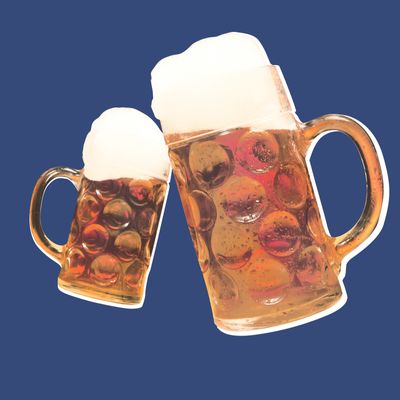
It is a truth universally acknowledged that whenever a TV character agrees to “just one drink,” disaster is about to ensue. “Just one drink” is what happens right before said character actually has a whole bunch of drinks and then sleeps through a life-changing job interview, or makes some unfortunate choices regarding an ex, or gets a really regrettable tattoo. “Just one drink” is a phrase made of famous last words.
“Just one drink,” though, is also a loaded phrase in another way: Nobody can seem to agree on what it actually means. A study published this week in the journal Addiction found that the definition of a single drink varies wildly from country to country (in one case, by more than 200 percent) — meaning the definition of unhealthy drinking is fuzzy, too.
The study authors compiled a list of 75 countries they thought were likely to have a standard definition for what makes a drink, pulled from the World Health Organization and their own best guesses. Of those 75, they were only able to find information for 37. (Four countries — Israel, Lesotho, the Netherlands, and Norway — confirmed that they had no standard definition; for the rest, the researchers just couldn’t find one, though they acknowledge that doesn’t mean one doesn’t exist.)
And within those 37, the definitions were all over the place. At one end of the spectrum, Iceland and the U.K. define a drink as a beverage containing eight grams of pure alcohol; on the other, Austria puts it at 20 grams. And some places offer a range, or a hyperspecific measurement: Switzerland, for example, says that one drink can be anything from 10 to 12 grams, while Luxembourg puts it at 12.8 grams exactly. In the U.S., a standard drink is 14 grams, which the Centers for Disease Control translate to roughly 12 ounces of beer, 8 ounces of malt liquor, 5 ounces of wine, or a single 1.5-ounce shot of hard liquor.
The other equally confusing layer was how each country laid out its guidelines for alcohol consumption. Nine countries had separate drinking guidelines for “special occasions.” Chile defined high-risk drinking as anything more than 56 grams per day; Sweden and India were among the most conservative countries, capping it at 10 grams. Some places had different guidelines for men and women, or separate guidelines for “special occasions.” Some calculated a weekly limit by multiplying their daily recommendations by seven, while others assumed people would drink only a few days a week.
According to study author Keith Humphreys, a psychiatry professor at Stanford, such dramatic differences means that alcohol research often won’t hold up across cultures. Two studies may come to opposite conclusions about the link between heavy drinking and cancer, for example, just because their authors define heavy drinking very differently.
“We’re participating in a discussion where people don’t agree on the most basic terms,” Humphreys says, largely because cultural values have influenced what constitutes acceptable drinking behavior: “We’re trading off valuations. If you asked, ‘How important is it to be fun versus to be safe?’ you would get different answers from Germans and Americans and Fijians.”
In part, he said, the discrepancies also have to do with the perceived riskiness of drinking, both in the short term and over the course of a lifetime. “The consequences of drinking could be genuinely different in different cultures. In Britain, if you drink too much, no matter how badly you hurt yourself, you’ll always have health insurance,” he says. “[And] if you’re lucky enough to live in a society where life expectancy is 80, you’re going to appraise risk differently than if it’s 60.”
“At the same time, we all have bodies. We all have organs,” Humphreys adds. “It’s not as if this is completely socially constructed.” It’s socially constructed enough, though, that an objective global definition of just one drink — and of healthy versus unhealthy drinking — may be an impossibility.




